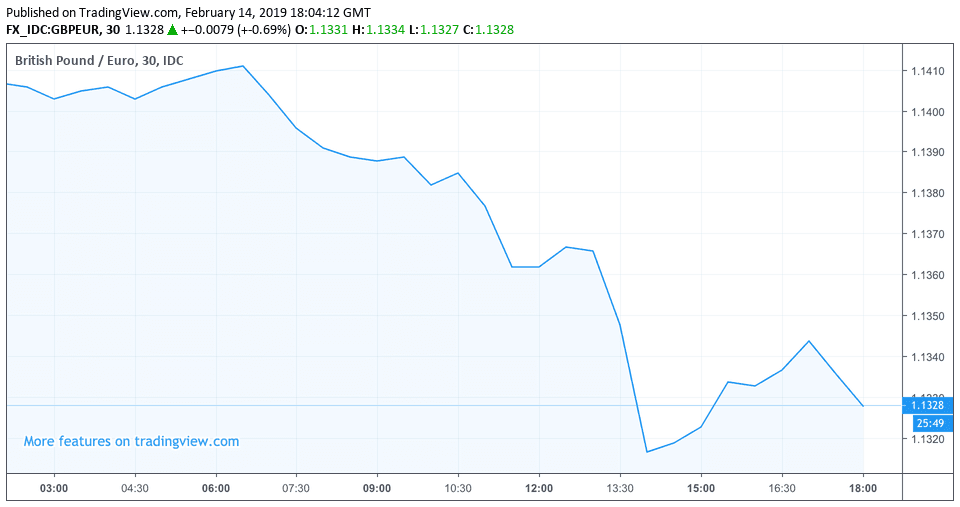Pound-to-Euro Exchange Rate Back Below 1.14, Government Loses Another Vote on Brexit

Above: Steve Baker MP, says voting for the government's motion sends the wrong signal to the EU. (C) Pound Sterling Live. RT.
- Government loses vote on Brexit strategy
- Sterling heads to lower edge of Feb. range vs. Euro
- Euro draws a bid on Eurozone GDP statistics
Pound Sterling has over the past 24 hours dipped below the key 1.14 mark against the Euro amidst entrenched uncertatinty concerning the trajectory of Brexit negotiations with the EU and uncertainty over whether or not any Brexit deal will be passed by parliament before March 29.
Parliamentary paralysis was further entrenched after Prime Minister Theresa May suffered a fresh defeat in the House of Commons in the latest vote on her Brexit strategy by 308 to 258 after a swathe of Conservative party members abstained from voting with the government.
Members of the European Research Group - a bloc of Brexit-supporting MPs who advocate for a clean exit from the EU - withdrew their support for the government on the basis that the motion put before them as it implicitly ruled out a 'no deal' Brexit.
Recall, a 'no deal' Brexit is a worst-case scenario for Sterling, therefore the passing of the motion would have been positive for the currency if markets took the view it went some way in negating the prospect of a 'no deal'.
The Pound did not suffer any notable decline on the vote: in fact it appears the market was pricing in the loss ahead of time:

"Tonight's vote shows there is no majority for the Prime Minister's course of action in dealing with Brexit - yet again her government has been defeated," says Labour leader Jeremy Corbyn in response to the government's defeat.
The Pound-to-Euro exchange rate has tipped back below the psychologically significant area of 1.14 and is quoted at 1.1335 in the wake of the vote; placing it towards the bottom of the pair's February 2019 range. The declines are therefore not regarded as sinister yet, instead they appear to be symptomatic of a currency gyrating in a holding pattern as traders await fresh, tradable news on Brexit.
Members of the House of Commons were today asked to vote on Prime Minister Theresa May's Brexit strategy with the government tabling a motion calling on parliament to green-light the government's current Brexit strategy; namely the seeking of further concessions from the EU on the issue of the Irish backstop contained in the Brexit deal's Withdrawal Agreement.
The motion, had it been successful, would have effectively meant parliament backed the Prime Minister's decision to maintain further negotiations with the European Union.
What does this mean for the Pound-politics interplay going forward?
The BBC's Laura Kuenssberg notes the Prime Minister is still very unlikely to budge: "her plan has narrow chance of landing in the end, but calculation still she has to keep trying unless Parliament takes it out of her hands."
For the Pound, nothing has really changed: this vote was ultimately pointless in the grander state of play. What matters is the March 29 deadline and whether parliament can force the government into requesting a delay to Brexit.
"Maybe, just maybe, the penny will now drop with Prime Minister and her Chief Whip that the hardliners in the ERG want a no-deal Brexit and will stop at nothing to get it. Responsible MPs of all parties must come together on 27th and 28th March and stop them," says Nick Boles, a prominent Conservative party MP who is attempting to force through a softer Brexit in order to avoid a 'no deal'.
Boles has a point.
"There will be some administrative disruption" if there is no deal says Steve Baker, a prominent member of the ERG, in a BBC interview on Friday, adding that many of the warnings on the negative effects to the economy of no deal are "reckless" and last night's government defeat amounts to "a storm in a teacup".
Brexiteers in the European Research Group indicated ahead of the vote they could not back a motion that implicitly rules out a 'no deal' Brexit.
"We cannot vote for this as it is currently configured because it rules out no deal and removes our negotiating leverage in Brussels. The prime minister, if she went through the lobbies for this tomorrow night, would be voting against the guarantees she has given in the Commons for months. It is madness," says Mark Francois, vice chair of the European Research Group.
"Conservative MPs really ought not to be associated with anything, express or implied, which seems to take 'no deal' off the table," adds Baker.
The defeat has no direct, practical impact but could undermine May’s credibility with the EU.
International Trade Secretary, and Brexiteer, Liam Fox warned ahead of the vote, "our European partners will be watching our debate and listening today to see if they get the impression that if they were to make those concessions Parliament would definitely deliver. There's a danger that we send the wrong signals."
On the surface, a defeat could be regarded as being a negative for Sterling in that it lessens the chance of May securing concessions that can usher forward a Brexit deal by March 29.
However, another perspective to be conscious of is a defeat would also signal to the EU that they must yield those much-needed concessions on the Irish backstop if their Brexit deal is to pass through parliament, after all, the EU wants the deal to succeed.
No substantive progress on Brexit is expected in Brussels over the course of February with EU officials now pointing to the scheduled 21-22 March European Council that sees all the EU's leaders gather.
This suggests any concessions might come late in the day for the UK, which implies the Pound could be in for a stagnant few weeks.
"Despite the ticking clock, we still think 'no deal' is the least likely Brexit scenario, however, we are raising its probability from 10% to 15%," says Mujtaba Rahman, Managing Director, Europe at Eurasia Group.
With the prospect of a 'no deal' Brexit still being given an outsider's chance by the market we don't expect any substantive decline in Sterling on the government losing tonight's vote.
"Volatility in GBP should remain low because the U.K. Prime Minister has stated there will be another vote in two weeks on 27 February," says Capurso.
Concerning the outlook for the British Pound against the Euro, we are eyeing support at 1.1350 noting the exchange rate has not closed below this point in February, with levels below here last witnessed on January 22.
"We remain in wait and see mode," says Robin Wilkin, a foreign exchange strategist with Lloyds Bank. Wilkin says a decline through 1.1312/1.13 support "would suggest we remain in the broader range" between 1.16 and 1.10.
Technical analyst Sheba Jafari at Goldman Sachs has meanwhile told clients she is bullish on the Pound's prospects against the Euro, but says Sterling must break 1.1630 before a new wave of gains commences.
The analyst eyes targets at 1.1874 and then 1.22 on a breakthrough.
Time to move your money? Get 3-5% more currency than your bank would offer by using the services of foreign exchange specialists at RationalFX. A specialist broker can deliver you an exchange rate closer to the real market rate, thereby saving you substantial quantities of currency. Find out more here.
* Advertisement
Euro Draws Support on Eurozone GDP Statistics
The Euro drew a supportive bid from the market in mid-morning trading Thursday after official data showed the single currency block dodging a downgrade of earlier estimates of GDP growth and the German economy avoiding recession in the final quarter last year.
Europe's single currency arrested and then reversed an earlier decline Thursday morning after Eurostat said the bloc's economy grew by 0.2% during the final quarter of 2018, confirming the initial estimate published in January, when many economists had feared the number would be downgraded to 0.1%.
This came hard on the heels of earlier data suggesting the German economy stalled during the final quarter of the year, with 0% growth, and although that was beneath the consensus for a reading of 0.1% many analysts had feared the economy may have entered recession.
"The poor German GDP headline earlier this morning was warning about a downward revision, but the EZ headline just about held on to its 0.2% growth rate, thanks to strong growth in a number of the smaller economies. We caution, however, that a downward revision is still a risk once the Irish data are fully incorporated," says Claus Vistesen, chief Eurozone economist at Pantheon Macroeconomics.
Thursday's date means the Eurozone economy grew by 1.8% in 2018, down from 2.4% the previous year, while the European Commission recently forecast the economy will grow by just 1.3% in 2019.
Quarterly growth rates in the Germany and the Eurozone fell by more than half throughout the 2018 year, from 0.7% at the end of 2017 to the 0.2% seen in the final three months of last year.
"The weakness of the economy in Q4 cannot be attributed to the supposedly-temporary problems in the auto sector given that we already know that vehicle production edged up in the last three months of the year," says Andrew Kenningham, chief Europe economist at Capital Economics. "We are still forecasting GDP growth of 1.0% in Germany this year, but there are significant downside risks to this forecast."




